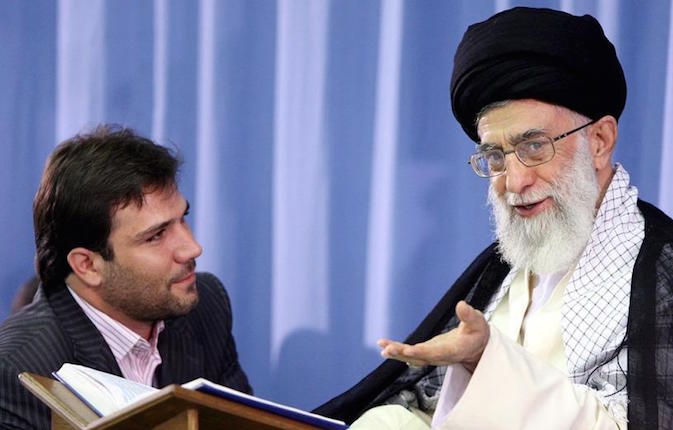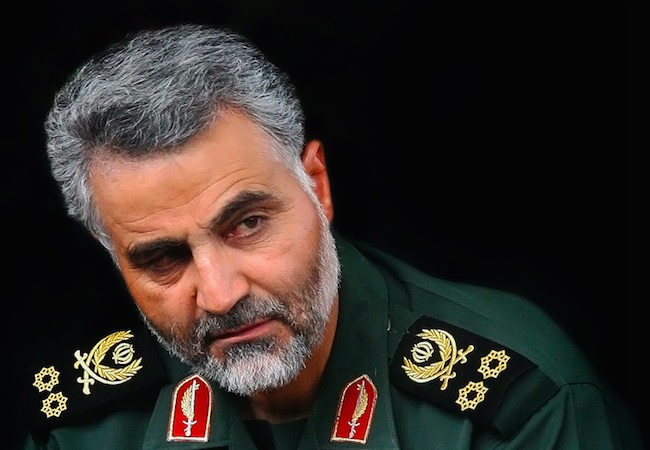Escalation or division? The Iranian situation: foreign and domestic

By Gregory Brew
Since Russia began its intervention into Syria in early October, the Islamic Republic of Iran has accelerated its own involvement in the conflict, sending hundreds (perhaps thousands) of Revolutionary Guard Corps (IRGC) into the country while mobilizing additional Shiite militias to aid the Syrian regime.
Indicators of its increasing involvement include repeated sightings of Quds Force commander Gen. Qasem Soleimani in Syria. Assad’s paramilitary National Defense Force (IDF) which Soleimani helped organize, now numbers 100,000 fighters and the deaths of multiple high-ranking Islamic Revolutionary Guard Corps (IRGC) officers have occurred, including Brig. Gen. Hossein Hamedani.
To a wary Western media, the joint Russian-Iranian intervention indicates a bad situation getting worse. Russian jets pound opposition groups fighting Syrian President Bashar al-Assad, some of them recipients of U.S. support. Russian capacities seem to have grown relative to the West, especially in key tactical areas like electronic warfare (EW). Reputable analysts point to an emerging Russian-Iranian alliance, one which is acting on diminishing American power in the region and is being used by each power to further their own specific foreign policy goals.
There remains a disparity in power wielded by the American and Russian governments. Putin can offer air strikes, “volunteers” and muscular displays of attention-grabbing public diplomacy, yet his regime has nowhere near the military, economic or cultural influence emanating from the United States. The U.S. has promised enormous new military aid packages to its Middle East allies, and recently the Pentagon approved the sale of advanced warships to Saudi Arabia, worth $11 billion. There remains a U.S. commitment to striking Isis targets from the air while providing support to U.S.-friendly groups, including the Kurdish peshmerga. On 22 October U.S. forces successfully rescued 70 ISIS hostages from a complex in northern Iraq, at the cost of a single American casualty. While the presence of Russian jet fighters in the skies over Syria at first prompted concern over mid-air collisions with U.S. air missions, Moscow was quick to reach an agreement over airspace control and communication with U.S. forces in the area.
The larger questions concern Iran. It’s true, Tehran’s actions in quietly boosting its involvement in Syria have caused concern in the West, especially as the machinery of the Joint Comprehensive Plan of Action (JCPOA) slowly begins to turn. The Washington Post pointed to Iran’s activities as indications of American timidity, even as the Obama Administration trumpets its achievements in nuclear diplomacy. The much-touted effects of the Iran deal in easing long-standing tensions between the U.S. and the Islamic Republic don’t seem to have materialized, as Iran works to strengthen its position in Syria and re-assert its influence over Shiite groups in Iraq, Afghanistan, Lebanon and elsewhere.
Then there’s the concern that this combined Russian-Iranian intervention will create a new monster for the West: a Moscow-Tehran alliance, bound by shared military objectives, with Iranian missiles planted in Syria within range of European capitals and Russian warships patrolling the Persian Gulf, operating out of Iranian ports. For those who see a more assertive Iran as detrimental to U.S. interests and the security of Europe and Israel, it paints a grim picture.
Yet that isn’t the whole picture. At least not when the Iranian domestic political situation is taken into consideration. Political conditions within Iran are the most divisive they have been in years. A strong party of reformers and moderates back Prime Minister Rouhani’s efforts to open Iran up to the West, and street celebrations among Iran’s urban youth (who are increasingly seeking out Western fashions, food, media and culture in violation of Iran’s strict rules) praising Foreign Minister Javad Zarif were among the first reactions to the nuclear deal reached in July.

There have been profound shifts in Iran’s domestic political scene, similar to those which presaged similar moderate movements in the late 1990s. Even formerly radical figures like Massoumeh Ebtekar, who was made famous in Western as the chief English-language spokeswoman for the takeover of the US embassy in 1979, have come over to the reformer cause. Reform candidates could seize a larger role in the country’s Parliament and the influential Council of Experts, which both have their elections this coming February. Among the leading candidates for a seat on the Council is Hassan Khomeini, the grandson of Grand Ayatollah Ruhollah Khomeini, and is widely believed to hold reformist positions on multiple issues.
Yet even as moderates seem determined to instigate a political sea change, hard-liners are working to stop them. Conservative clerics, military leaders and politicians have repeatedly denounced the actions of moderate ministers. When Zarif and President Obama unexpectedly shook hands during a meeting on October 7, hard-liners declared it tantamount to treason. Rouhani himself publicly argued with Tehran’s police chief last year over the aggressive enforcement of Iran’s law mandating that women wear head coverings at all times, declaring that many religious issues “are matters of individual faith.”
The most powerful figure in Iran, Supreme Leader Ali Khamenei, is equivocal in his support for Rouhani and Zarif’s diplomacy. His recent acceptance of the deal came only with the strict provision that no further sanctions be placed on Iran, by any country, at any time. In the weeks before this declaration, Khamenei took the opportunity to discount any real opening up with the United States; during a speech before a crowd of young Republican Guardsmen, the Supreme Leader called such an idea “detrimental” and harmful to Iran’s future. Khamenei has made it clear that he will brook no compromise with the West that limits Iran’s sovereignty or its ability to manage its nuclear program for domestic purposes.
Rouhani and Zarif walk a thin line, but there are factors working to their advantage. Despite his reformer credentials, Rouhani is not likely to be ousted and marginalized the way that Mohammed Khatami was after his own attempts at reform in the 1990s. Extremely popular despite the country’s ailing economy, Rouhani faces little opposition from other major candidates and is widely believed to win re-election in 2017.
Moreover, there is little chance of tampering in February’s elections, as no political faction in Iran wants a repeat of the 2009 violence. They are likewise extremely wary of the kind of political instability that characterized the “Arab Spring” movements of 2011. While there is a chance that moderates may make gains in the Majlis, the more important elections will be for seats on the Council of Experts. While traditionally something of a ceremonial body, the Council wield the authority to choose the country’s next Supreme Leader. With the 79-year old Khamenei visibly ailing, there is a good chance the new Council elected in February will be responsible for choosing his successor.
Iran’s activities in Syria are a continuation of a long-standing Iranian commitment to Syrian security, a legacy of its post-1979 foreign policy. Yet while Russian and Iranian interventions appear as a specter of a troubled region growing even more unstable, in truth the situation appears very far from resolution. It is certain, however, that any peaceful conclusion to the war in Syria will depend on active diplomacy with both Iran and Russia.




